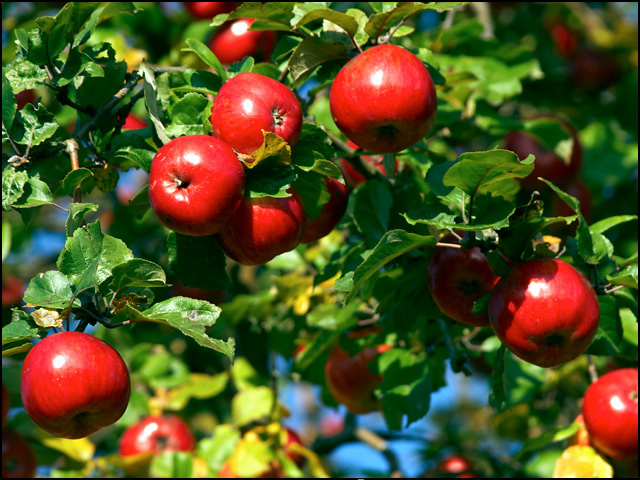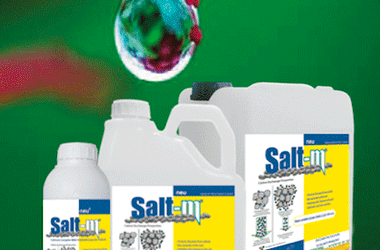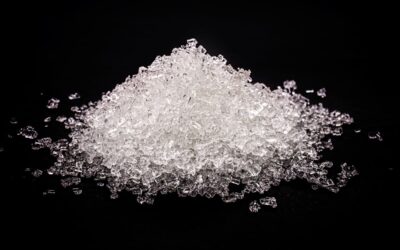Our Product Picks for Apple
Effective Fertilization Recommendations in APPLE PRODUCTION
The amount of fertilizer to be given to apple orchards varies according to the soil cultivation method, the character of the soil, the growth power of the tree, its age, and the amount of crop taken. The best amount of fertilizer to be given should be determined by soil and leaf analysis.
Before planting seedlings in apple orchards, a basic fertilization should be done. After planting, the garden should be fertilized every year.
When nitrogen fertilizer is given to apple orchards in spring, fruit quality improves and shedding decreases.
Apple trees are able to take the necessary phosphorus from the soil with their strong roots. Phosphorus helps the tree grow and increase the crop. Since it is an element that moves very little, care should be taken to apply phosphorus fertilizers to the area where the roots are located.
In the absence of potash in apple trees, firstly, the leaves start to turn yellow, then the brown leaves completely dry and die. In dry years, potash deficiency is more harmful. Potassium is an element that has an effect on photosynthesis, starch and sugar production of trees. Since it plays a role in the formation of flower buds, potassium prevents periodicity.
1. Iron Deficiency in Apples
The symptom that occurs in case of deficiency is called chlorosis or jaundice. Araz shows itself more in calcareous and nutrient-poor soils. Especially in the rainy seasons, the situation is exacerbated.
In cases where chlorosis is caused by iron deficiency, the leaf veins are green, whereas the intervascular tissue is yellow. The symptom begins on young leaves and progresses to older leaves. On the edges of such leaves, reddish or brown drying occurs over time. Due to the disruption of photosynthesis, the development slows down, the yield decreases and as a result the tree may die.
Chlorosis is caused by the excess lime taken into the plant body and the free iron contained in the plant. Iron, which acts as a catalyst in the chlorophyll formation, cannot perform this task when it is retained by lime.
Iron retention does not only occur within the plant. Iron II compounds in extremely calcareous soils. It turns into iron III compounds and binds to the soil and cannot be taken up by the plant.
Of the apple varieties, Amasya is very sensitive to chlorosis, while Starking Delicious and Golden Delicious are moderately sensitive.
Treatment of iron deficiency is with NEUX-IRON (EDDHA chelated iron). The application of these drugs to the soil gives better results than the application of leaves.
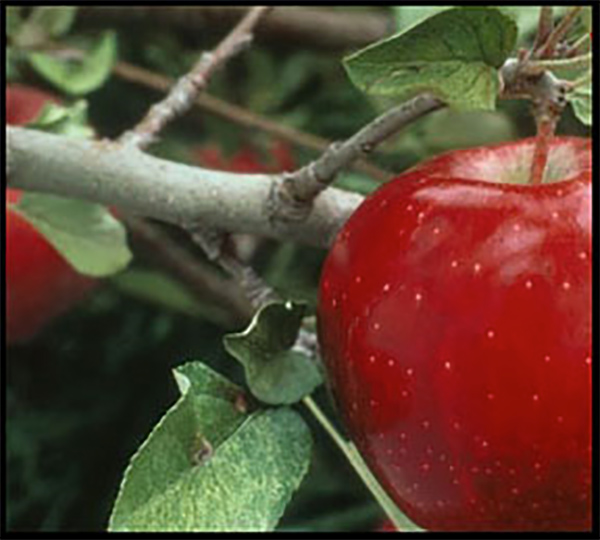
2. Zinc Deficiency in Apples
The symptom that occurs in case of deficiency is called rosette due to the condition of the leaves. Its deficiency draws attention especially with the small leaves on the shoots. Products such as NEUX-ZINC, NEUPROTEC, NEUENERGY can be used for its treatment.
Other trace elements such as magnesium, boron, manganese, copper, molybdenum… etc. such as trace elements.
|
Fertilizer |
Ingredient |
Timing |
Dosage |
|
NeuNitro 20 – 0 – 0 |
Slow Release Azote |
Right Before Blooming |
150cc/da |
|
NeuProtect |
High Phosphorus and Zinc |
In Blooming |
250cc/da |
|
NeuGarg |
High Phosphorus and Potassium |
In Blooming |
250cc/da |
|
NeuOrganic-80F |
Organic Matter |
In Growth 1-2 Application |
250cc/da |
|
NeuPhyto |
Liquid Potassium |
In Growth 1-2 Application |
250cc/da |
|
NeuCombi |
Micro-Elements Composition |
In Growth 1-2 Application |
200cc/da |
|
NeuProffesional 20-20-20 + TE |
NPK |
In Growth |
250gr/da |
|
NeuRoot-Mix |
Calcium and Boron |
After Fruting Starts 2 – 3 Apllication |
250cc/da |
|
NeuCu-9EL |
High Concentrated Copper Sulphate Solution |
Every Stage 1 – 2 Apllication |
250cc/da |
|
NeuProfessional 15-5-35+TE |
High Potassium |
Before Harvest |
150-200 cc/da |
|
250gr/da |
Special Products:
- NEUTHERM is a product specially developed for hot-cold stress conditions. It has been proven to prevent water loss, fertilizer loss by 25%.
- NEUBIO-SC apple wormwood is an organic product specially developed for webworms. It is completely harmless to bees and beneficial creatures. Recommended application dose is 100 cc/100 lt.
Note: According to the size of the fruit, nitrogen and zinc supplements should be made if necessary. (NeuNitro 20-0-0 and NeuEnergy are recommended.
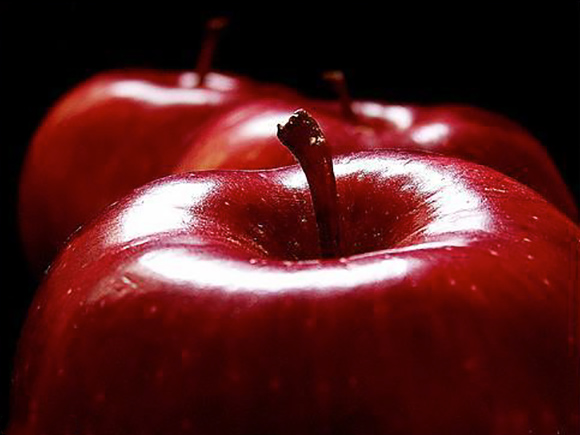 Nitrogen is the nutrient element that affects the yield most in apple orchards, as it is in all plants. In nitrogen deficiency, tree growth slows down, stunting occurs, and yield drops significantly.
Nitrogen is the nutrient element that affects the yield most in apple orchards, as it is in all plants. In nitrogen deficiency, tree growth slows down, stunting occurs, and yield drops significantly.
Phosphorus provides root development and spread, plays a role in flower and fruit formation, accelerates ripening. The periods when apple trees need phosphorus the most are before flowering, flowering and fruit set periods. Therefore, all of the phosphorus is applied before the first fertilization time, which is the shoot development. In phosphorus deficiency, flowering is delayed, the fruits are small and very thin-skinned, the juice of the fruit acquires a sour aroma.
Potassium, on the other hand, directly affects the amount of juice, sugar content, vitamin C level, size, color and physical endurance of the fruit. In potassium deficiency, yield decreases, fruit color formation decreases, fruits become rancid and storage period is shortened.
